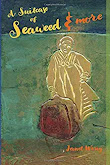I had forgotten what a big deal Lucille Clifton is to me. I knew her first as the author of the Everett Anderson books which were so important in my early work with Black and Brown children. Then I became a Marylander and learned about her important role in the American poetry "establishment." But most of all, her style, brief and fluid and unflinching, leads me.
There's so much to discover and discover anew in BLESSING THE BOATS (BOA Editions, 2000), but I chose this one, without really noticing that its title describes what I am doing. You know it's a good poem when you think it's about one thing but it turns out to be about a whole different thing too.
study the masters | Lucille Clifton
like my aunt timmie.
it was her iron,
or one like hers,
that smoothed the sheets
the master poet slept on.
home or hotel, what matters is
he lay himself down on her handiwork
and dreamed. she dreamed too, words:
some cherokee, some masai and some
huge and particular as hope.
if you had heard her
chanting as she ironed
you would understand form and line
and discipline and order and
america.
And then, again because I hadn't given it its due, I pulled down A SUITCASE OF SEAWEED & MORE (Pomelo Books, 2019) by our well-known-in-this-community Janet Wong. Look how she also brings the language and the textures of working outside beneath behind within, of smoothing and crimping to meet the demands of the dominant culture. These two short poems both deliver words "huge and particular as hope."
Joyce's Beauty Salon | Janet Wong
They call my mother
the perm lady, "Pum Ajima."
Dozens of mad Korean women
come in each month, ugly,
furious with their families,
frustrated by their stubborn,
straight, heavy, hair.
A few hours with Mother
and they leave
carrying a lighter load,
their carefree curlsbouncing out the door.
The named women, their hands, invisible yet so central to the scene, the moment which is minutes, hours, a lifetime; the women who go by names from languages not their own all around us...thank you, Lucille and Janet.
Our host today is Jan Godown Annino at Bookseedstudio, where there is singing, so much singing going on! Go hear the angel voices.
***************************************
*This set of white supremacy culture definitions has popped up before me in several situations--this one shared by a fellow participant in a study group, so I don't have attribution. But I'm having to see that I am--despite my efforts to acknowledge and honor other ways--a walking, talking, teaching, writing embodiment of this culture. Claiming that I can, on a whim, at the drop of a hat, teach myself a general poetry survey, is putting many of the assumptions below into action. I'm trying to do better.










